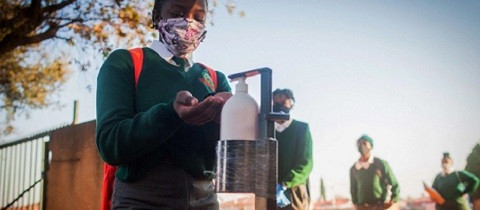
GCED Basic Search Form
Quick Search
Vous êtes ici
Nouvelles

As COVID-19 affected the globe, it forced many students to rely on distance learning as schools closed. With no end to the pandemic in sight, governments and organizations need to adapt to the new realities of this pandemic.
The Palestinian Ministry of Education (MoE), recognizing the changes unfolding, plans to reopen schools early August, 2020. In this context, on 11 June, the Palestinian MoE and UNESCO organized a meeting with key education partners (including Ireland, Finland, UNRWA, Save the Children, and UNICEF) to discuss the school re-opening plan in Palestine in hopes of finding solutions and raising awareness on different issues to be faced. The meeting focused on policy formulation regarding appropriate restructuring of learning for the school reopening.
The Minister of Education, Dr. Marwan Awartani, attended the meeting and expressed his appreciation to all education partners supporting the Ministry to have a safe return to school. Besides the urgency of finalizing the plan for reopening schools, he notably emphasized the need for greater coordination among ministries and other key actors with a view to ensuring that measures such as social distancing among students are effectively implemented. He also confirmed that an assessment of distance learning, which is important for remote areas with limited access to technical resources, was necessary.
In order to guide the back to school planning process in Palestine, UNESCO Ramallah, presented the global framework, developed by UNESCO, UNICEF, WFP and the World Bank designed to guide different countries around the world in this critical intervention. The importance to consider safe operations, well-being, blended learning and the most vulnerable of students in responses and interventions was also underlined, as well as the necessity of ownership by the national stakeholders.
During the discussions, it became clear that several ideas and draft plans (e.g. from UNRWA) already existed on which it was suggested to build upon in order to optimize the use of the funds available and avoid duplication of efforts. UNRWA presented their draft plan, which the Ministry was interested to consider.
The meeting ended with several positive notes. While the rapid spread of the COVID-19 in Palestine is unfortunate, it also presents an opportunity to try new desired methods for teaching and learning. While the current landscape is unpredictable, it is important to agree upon specific principles in order to begin the implementation of the back to school plan. Any reopening should take into account a possible resurgence of a second wave of the pandemic. Thus, parents should be heavily involved to prepare and guide their children in education. At the same time, parents must not be seen as substitute teachers, as this would not provide the required equity of education to all students. While the meeting was attended by the Ministry of Education, UNESCO and other international agencies involved in education, more partners such as private schools and the civil society, should be involved in future discussions.
As a concrete way forward, the formation of a specialized Task Team (TT) on School Reopening was suggested. Smaller teams would meet to discuss key issues in areas of the school reopening framework, presented by UNESCO, which should inform the work of the TT. The Ministry of Education was also advised to present its emergency plans and the initial plan for school reopening in the upcoming Education Sector Working Group meeting. The Ministry of Education suggested that UNRWA, UNESCO and other key agencies meet as soon as possible to develop a concrete plan, based on the discussions brought up in this meeting.
A follow-up meeting took place on 30 June to discuss the progress on the school re-opening plan. The MoE, UNESCO, UNRWA, UNICEF and Save the Children attended the meeting. Dr. Basri Saleh, Deputy Minister opened the meeting, confirming that ensuring the readiness of schools, students, teachers, content and tools are very important pillars in the school re-opening plan. He further emphasized that education partners should continue the discussion with different departments at the Ministry for the preparation of the plan. Interventions, including related to hygiene, safety, teacher training, and distance learning, will be integral elements in the development of the plan, which will also include the financial needs for all activities. He also commended the work done by the education partners on all fronts as the only way to have a safe return to school.
UNRWA mentioned its financial gap for the implementation of its plan for school re-opening, mentioning some 5 million US$ to cover the expenses of additional teachers and counselors. UNRWA’s plan is to open from Saturday to Thursday for half of the students, every day, depending on the spread of the virus using a blended approach.
For more information on UNESCO’s activities in Palestine, please visit www.unesco.org/ramallah and visit us on  : Unesco Ramallah Office
: Unesco Ramallah Office
For more information on this event, please contact Ms. Sonia Ezam, Senior Programme Officer at the Education Unit of UNESCO National Office for Palestine, at s.ezam@unesco.or(link sends e-mail)(link sends e-mail)
URL:
